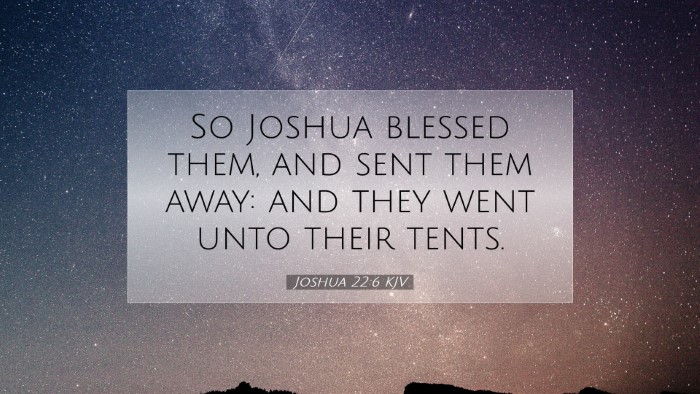Commentary on Joshua 22:6
Joshua 22:6 reads: "So Joshua blessed them and sent them away; and they went unto their tents." This moment in the narrative represents a culmination of faithfulness and obedience, highlighting key themes pertinent to pastors, students, theologians, and scholars.
Contextual Overview
This verse comes at the end of the military campaigns led by Joshua to secure the Promised Land. The two-and-a-half tribes of Reuben, Gad, and half the tribe of Manasseh were returning to their territories east of the Jordan River, having fulfilled their promise to aid their brethren in conquering the land. The context is critical for understanding Joshua’s actions and words within this passage.
Commentary Insights
1. The Act of Blessing
As noted by Matthew Henry, Joshua's act of blessing is significant. It serves not only as a formal farewell but also as an impartation of divine favor. Blessings carry a weighty importance in Hebrew culture, encapsulating the hope for guidance, protection, and prosperity. Henry emphasizes that this blessing was a recognition of the obedience these tribes demonstrated. In sending them away with a blessing, Joshua acknowledges their loyalty to God’s command and their brothers.
2. A Lesson in Fulfillment
Albert Barnes highlights that the sending away represents a fulfillment of purpose and promise. The tribes had committed themselves to assist in conquest, and their return signifies the completion of that divine mandate. This transition also foreshadows the necessity for all of Israel to continue living in unity and covenant before God. Barnes reflects on the importance of recognizing how individual actions contribute to the collective faith journey of the community.
3. The Importance of Community
Adam Clarke draws attention to the communal aspect of the Israelites' journey. He notes that although these tribes were returning to their own lands, they were still part of the greater community of Israel. Clarke suggests that their departure should serve as a reminder to all believers about maintaining ties with the fellowship of faith even when physically apart. The unity of the tribes under God’s covenant is a vital theme that resonates throughout the Scriptures.
Theological Reflections
The sending away of the two-and-a-half tribes invites deeper reflections on obedience, community, and blessing in a modern context.
1. The Nature of Divine Blessing
Pastors can reflect on the nature of divine blessing and its implications for their congregations. Blessings initiate a cycle of faithfulness that encourages believers to pursue God’s will in their lives. The act of blessing serves as a reminder of God’s continual guidance and the call to obedience which resonates throughout the biblical narrative.
2. Commitment to Community
The passage highlights the importance of commitment to the community of faith. Even as individuals pursue personal journeys, they are part of a larger Body. The two-and-a-half tribes exemplify how individual pursuits should not eclipse the greater communal responsibility toward God and one another. This principle is vital for students and academic scholars concerned with ecclesiology and the role of the Church in individual believers’ lives.
3. Continuity of Faith
The placement of this narrative at a transition point in Israel’s history underscores the importance of continuity. As the Israelites faced the challenge of establishing themselves in new lands, the need for unwavering faith was paramount. This is relevant for today’s Church, which must constantly navigate issues of faithfulness amidst diversity and change.
Practical Applications
In applying the lessons from Joshua 22:6, various actionable insights arise for modern ministry.
- Encourage Blessings in Leadership: Leaders should practice impartation of blessings in everyday contexts, fostering a culture of encouragement and divine favor.
- Facilitate Community Building: Promote events that strengthen the bonds within the church, ensuring the congregation recognizes its interconnectedness.
- Teach the Value of Commitment: Emphasize the importance of commitment to one another while acknowledging personal aspirations, using the example of the tribes to illuminate this balance.
- Embrace Transition: Recognize and prepare for transitional phases in ministry with prayer and guidance to ensure continuity of faith and mission.
Conclusion
In sum, Joshua 22:6 serves as a profound reminder of the interconnectedness of obedience, community, and divine blessing. The insights drawn from the public domain commentaries emphasize the enduring relevance of these themes for today’s Christian journey. As we learn from the Israelites’ experience, may we too strive to bless, support, and remain committed to one another in our collective pursuit of God’s purpose.


